Part One
Memorie.al / On September 2, 1969, at the age of 79, the Vietnamese communist leader, Ho Chi Minh, passed away. He was known as a communist revolutionary and statesman who held the position of Prime Minister of Vietnam from 1945–1955, and from 1955 to 1969, served as the President of the Democratic Republic of Vietnam (North Vietnam). In 1957, while serving as President of Vietnam, Ho Chi Minh also visited Albania, touring several districts of the country. Since the break in official relations with the Soviet Union in 1961, the communist regime of Tirana, led by Enver Hoxha, considered Vietnam as one of its friendliest and closest states, second only to the People’s Republic of China. Based on this, in September 1969, official Tirana dispatched a delegation to Vietnam to participate in the funeral ceremonies of Ho Chi Minh. The delegation was headed by a member of the Political Bureau of the Central Committee of the Party of Labor of Albania (PPSH), Rita Marko, who at the time also held the position of Deputy Chairman of the People’s Assembly of the People’s Republic of Albania, as well as the First Secretary of the Party Committee of the Durrës district. After returning from Vietnam and the People’s Republic of China, where the delegation paid a friendly visit, as dictated by the “Party’s norms and rules,” Rita Marko reported to Enver Hoxha and the other “comrades” of the leadership regarding those visits. This is reflected in the relevant minutes bearing the “Top Secret” signature, which Memorie.al is publishing in several installments.
TOP SECRET
Notes taken during the verbal report given to the First Secretary of the Central Committee of the Albanian People’s Party, Comrade Enver Hoxha, on September 19, 1969, by Comrade Rita Marko, head of the delegation that visited the Democratic Republic of Vietnam, to attend the funeral of President Ho Chi Minh, as well as the visit to the People’s Republic of China.
Comrade Enver invited the following comrades to the meeting to listen to Comrade Rita Marko: Mehmet Shehu, Haki Toska, Hysni Kapo, Ramiz Alia, and Xhafer Spahiu. Comrade Enver immediately gave the floor to Comrade Rita Marko.
COMRADE RITA MARKO: When we arrived in Hanoi, we were met by Vietnamese leaders. The member of the Political Bureau who had been to Albania, Hoàng Văn Hoan, was at the airport. They speak well of him, but it is said that he is ill. When I asked him about his health, he told me he was not ill.
Hoàng Văn Hoan seems to be pro-Chinese, a good man. On the way from the airport to the house where our delegation would stay, we were informed that the funeral ceremony would take place in two days, at 10:00. However, suddenly, in the evening, we were informed that it would be the next day and an hour earlier, at 9:00, due to the great heat.
A member of the Central Committee accompanied us on the way from the airport to the house. We later laid a wreath at the building where Ho Chi Minh’s coffin was placed. We noticed the very harsh situation everywhere, as people everywhere had a look of suffering on their faces, even the cadres who accompanied us. The Chinese delegation led by Li Xiannian arrived in the afternoon. Upon arrival at the airport, he immediately asked to meet with us.
We agreed to organize the meeting at their embassy because it was a good and safe place. Li Xiannian asked me about my health and then conveyed the invitation of the Chinese party and government leadership to send a party and government delegation to them on the occasion of the 20th anniversary of the proclamation of the People’s Republic of China. He told us that they would not have a big celebration for the 20th anniversary, but they expect an Albanian delegation to visit on that occasion.
The Vietnamese had informed us about the change in the program of Ho Chi Minh’s funeral ceremony before our meeting with the Chinese delegation, and for this reason, when Li Xiannian started the conversation and began to tell us when Ho Chi Minh’s funeral would take place, I interrupted him and informed him that they told us it would be the next day, at 9:00, and thus the Vietnamese comrades might not have been able to inform you about this change, for which they may notify you later. Their ambassador in Hanoi immediately went out to clarify this issue.
Li Xiannian told me that during the ceremony, our two delegations would stand face-to-face with the Soviets and the delegations of other revisionist countries. For you, he continued, it is easier, but we have diplomatic relations with everyone, so it will happen that we will have to shake hands.
I replied that, in my personal opinion, it is not right for you to meet the Soviet delegation because all the situations that have occurred so far have shown that the revisionist leaders of Moscow are enemies.
Li Xiannian interrupted me, saying that this is not the case, that we are representatives of two countries that have diplomatic relations, so it is normal to shake hands with each other and that there is nothing harmful in this.
A military member of the delegation intervened in the conversation after him, saying that we will not take the initiative to shake hands, but if they try to shake ours, then we will do it.
I replied again that even this course of action is not right, that in this line of thinking, you contradict yourselves. The discussion of this issue lasted about 20 minutes.
Among other things, Li Xiannian emphasized that the same thing happened four or five years ago with Comrade Manush Myftiu. So I interrupted him: Since that time, has the situation in the Soviet Union perhaps changed for the better for you, prompting you to take this step? On the contrary, many things have happened since then, and now we are very clear about what the Soviet revisionists are, so personally, I do not agree that you should meet them.
Following the discussion on this matter, Li Xiannian informed me that he had been tasked by the Party Central Committee to propose that before our delegation returned from Vietnam to Albania, we should pay a visit to Beijing.
On the morning of September 9, the day of Ho Chi Minh’s funeral, the Vietnamese invited all the heads of delegations to the assembly podium. I want to emphasize that, viewed from the outside, the Vietnamese acted correctly with us at all times and showed respect for our delegation.
On one side of the podium, they had placed the Prince (Cambodian royal Norodom Sihanouk after the Chinese official), then (Vietnamese politician and Prime Minister) Phạm Văn Đồng, then the head of the Romanian delegation, (Vietnamese party official) Lê Thanh Nghị, after whom I stood, then the Bulgarian, and so on.
On the other side, the first was (Soviet party official Alexei Nikolayevich) Kosygin, followed by the others. I carefully followed the conversations and everything that happened during the ceremony, but I did not hear or see anything on the podium where the heads of delegations stood.
Before going out to the podium, all the heads of delegations had gathered in a room, but Kosygin was not there, nor was Li Xiannian. Inside, they had placed a large portrait of Ho Chi Minh, and people were paying respects and lighting candles around it.
The funeral service opened with a speech by (Vietnamese party official) Lê Duẩn, who was very cold towards us, and then the group played funeral marches. In the square where the ceremony was held, there were many people, and school students had been gathered. As soon as the ceremony began, everyone started crying. It was very touching. The ceremony was simple. It did not last more than an hour.
After the ceremony was over, Lê Duẩn was the first to descend the stairs and took Kosygin with him. Immediately after Lê Duẩn, Phạm Văn Đồng descended and took Li Xiannian with him and left him next to Kosygin. Thus, Kosygin and Li Xiannian found themselves facing each other.
We were paying attention to see how Li Xiannian would react. Kosygin moved towards Li Xiannian, extending his hand and smiling, but (Li) just stood frozen, he didn’t even move his head, he looked shocked, immediately turned his back on him and did not respond to the extended hand, and then walked away.
After the ceremony, we were received by Phạm Văn Đồng. Unlike Lê Duẩn, he spoke good words about our party and government, about Comrade Enver and Comrade Mehmet, thanked us for the assistance we had provided, etc. We also said good words about their struggle and expressed the sorrow of our people for the death of Ho Chi Minh.
When we parted, he said that they would fight to strengthen the friendship and unity between the two sides and conveyed his wishes for our comrades. I spoke to him about the work our party does in strengthening mutual friendship, took photos, and then he walked us out with his arm around my neck. His behavior was correct and impressed us.
When we were about to leave Hanoi, (the hosts) made sure to bid us farewell, just as they had welcomed us. Li Xiannian came to the spot designated for us at the airport. I did not turn back and did not ask him why he changed his mind and did not shake hands with Kosygin. He did this voluntarily himself, telling me that before the rally, as you saw, I was face-to-face with Kosygin, but I did not shake his hand, as you told me.
I told him I did not see it that as far as greeting Kosygin was concerned; it was purely my personal opinion. Only, I continued, when you were descending the podium stairs, I noticed that the newspaper correspondents were moving very much towards you. They are enemies, he said.
Then he told me that he had gone for a walk in Hanoi after the rally and was greatly impressed by the fact that the Vietnamese were not preparing for a war situation at all. I also noticed this situation, I told him.
The truth is that revolutionary morale has dropped significantly in Vietnam as a result of the Paris talks, (and) there is no mobilization, and the Vietnamese leaders are responsible for this, as they are also under other foreign influences, forces working directly to numb the revolutionary morale of the Vietnamese people. The other member of the Chinese delegation, a military man, told us that in China (they) are making war preparations and that we would see this for ourselves.1
We traveled to Beijing, together with the Chinese delegation that participated in the funeral of President Ho Chi Minh. At the airport there, we w2ere met by Kang Sheng and members of the Political Bureau of the Central Committee of the Communist Party of China (CPC), Yao Wenyuan and Xie Fuzhi, candidate members of the Political Bureau of the Central Committee (CPC) Liu Hsien Chuan, Wan Hsin Tin, Kuan Yen Nun and Li Chuan.
Candidate members of the Political Bureau in 1969 included Ji Dengkui, Li Xuefeng, Li Desheng, and Wang Dongxing, as well as several other members of the Central Committee (CPC) and other high-level functionaries. Immediately, Li Xiannian took Kang Sheng aside, and it seemed as if the two of them discussed what happened between Li and Kosygin on the day of the rally in Hanoi.
I waited until Kang Sheng finished, and then they took us to the villa where we would stay. Among the comrades who had come out to meet us at the airport were the Chief and Deputy Chief of the General Staff. The latter accompanied us during all our delegation’s visits to China, as well as the conversations with Kang Sheng.
We barely had time to rest in Beijing when the Chinese leaders hastened to prepare a program of visits. They proposed that we see the Beijing subway on the first day, telling us that it had not been inaugurated yet, and no one else had seen it yet. “You Albanians are the first to visit it,” he told us, and then added that; after the subway (we) would visit the metallurgical complex and have lunch with Comrade Kang Sheng.
The meeting between Zhou Enlai and Kosygin took place on September 11, exactly at 11:00, when we were having lunch with Kang Sheng, which had started at 12:30, thus knowing nothing about this meeting. During lunch, Kang Sheng spoke enthusiastically about our holiday and our country, and there was no further conversation. After we ate, Kang Sheng proposed that we go to the room for discussions.
He first spoke to us about the problems addressed at the IX Congress, the lessons they have drawn, and emphasized that after the Cultural Revolution, the IX Congress marks a major turning point in all the work of their party. Furthermore, he briefly touched upon the importance of the speeches delivered at the congress by Comrade Mao Zedong and Lin Biao, the internal situation in China, and how they have currently mobilized all forces for war.
Next, he spoke about the internal situation in China, the successes they have achieved, about the telegrams we sent to their congress, which, as is custom with formulas, “have been a great help and inspiration to the Chinese people and the Communist Party.” We have achieved many successes during and after the IX Congress, Kang Sheng continued, emphasizing that (we) published the documents of the IX Congress before they published them and thanking us for this.
Our ambassador in Tirana has informed you about the main content of the speeches held at the congress by Comrade Mao Zedong, he added, because we have always spoken openly with you and informed you about everything, while with other parties, we have not spoken. The IX Congress is the most important event for China and marks a line of demarcation between two phases in the history of our party, that before the congress and that after the congress, Kang Sheng said. Now we are drawing the overall picture of the lessons of this congress.
We have drawn the overall picture of Mao Zedong’s teachings on the existence of class struggle in our society, on contradictions and their resolution through a continuous revolution. In resolving these contradictions, we have found great strength in the Great Proletarian Cultural Revolution, as one of the forms of class struggle. These issues are clarified, he concluded, in Comrade Lin Biao’s report.
The Congress, Kang Sheng further added, also resolved a very important problem, that of ensuring the continuity of the teachings and ideas of Mao Zedong, through the election of Comrade Lin Biao as Chairman Mao’s successor. In this way, we have ensured the continuity of Mao Zedong’s ideas for hundreds of years. At the congress, we also approved the party statute, which briefly summarizes Mao Zedong’s ideas.
Kang Sheng said that the statute is now simpler and easier to understand than previous versions and those secondary things have been removed from it, that it is one of the best documents our party has ever had until now. It established that the building of our party will be done on the basis of Marxism-Leninism and Mao Zedong’s ideas.
Based on the statute approved by the IX Congress, we elected a Central Committee with 170 members and 109 candidates, its Political Bureau, and the Standing Committee of the Political Bureau of the Party Central Committee. With this congress, Kang Sheng continued, our party has been strengthened, in ideological unity as never before, (and) is becoming stronger from the organizational point of view, when it comes to the cadre issue.
The documents of the IX Congress state that the Proletarian Cultural Revolution has not yet achieved final success, therefore the party and all the workers of China are massively and resolutely fighting to implement the “struggle – criticism – transformation” movement, fighting for the purification of class ranks, to build party organizations at the grassroots level and (the struggle) against the theories of the Soviet revisionists and Liu Shaoqi. Deep work along this line is being carried out everywhere in factories and workplaces.
According to the information we have, the Soviet Union is not only continuing provocations against us, but is also concentrating troops on the border with us, Kang Sheng stressed, so based on the situation that has been created, we have called on the party and the people to prepare for war and are working concretely in this direction. On the one hand, the Soviet revisionists propagate in a big way as if China will attack the Soviet Union; on the other hand, they themselves are concentrating many troops around the Chinese border, continuing provocations and inquiries.
The measures they have undertaken clearly show that they wish to carry out armed aggression, because China has become the biggest obstacle in their imperialist path, but they face difficulties in the political, economic, and organizational sphere, so they cannot start the war immediately. However, all their combined undertakings do not intimidate the Chinese people.
During our delegation’s stay, they took us to visit an exhibition they have opened in Beijing, where they document, one by one, the armed provocations of the Soviet Union against China. Finally, Kang Sheng turned the conversation to where it hurt them. He explained that the quarrel among the Soviet leaders themselves is a great quarrel. Memorie.al




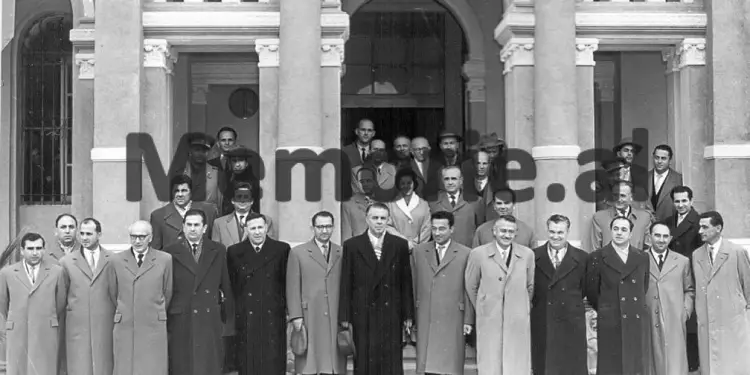
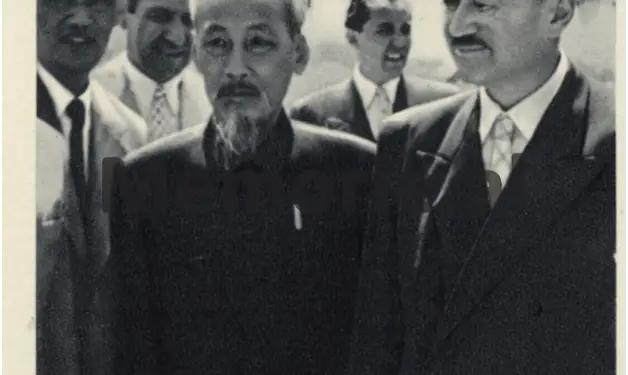
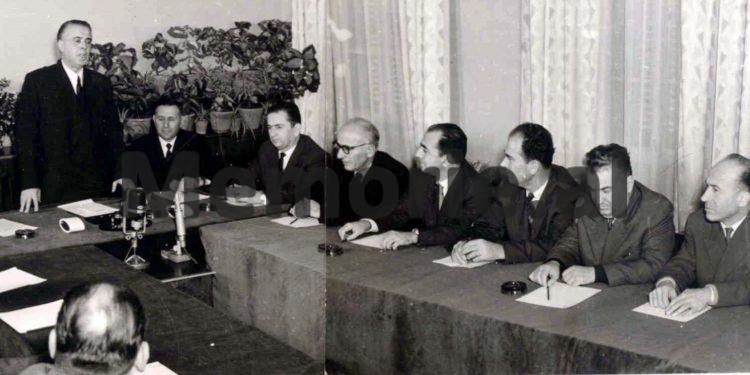
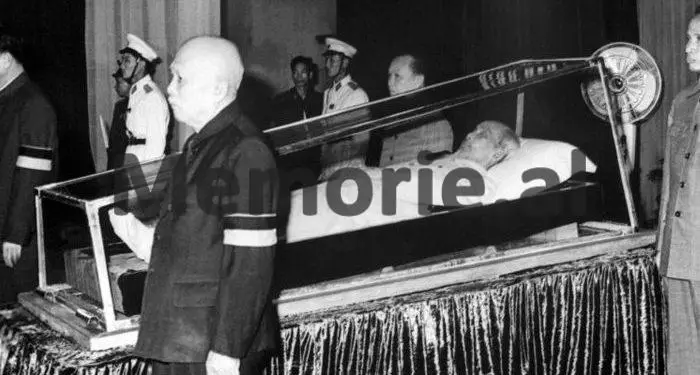



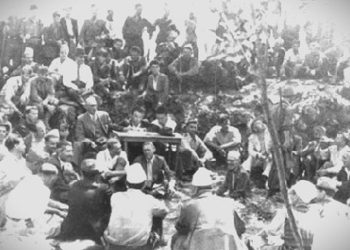
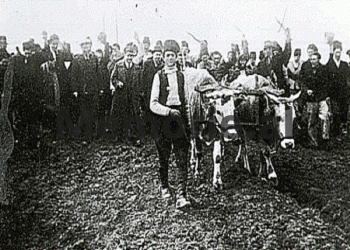
![“They have given her [the permission], but if possible, they should revoke it, as I believe it shouldn’t have been granted. I don’t know what she’s up to now…” / Enver Hoxha’s letter uncovered regarding a martyr’s mother seeking to visit Turkey.](https://memorie.al/wp-content/uploads/2026/01/Dok-1-350x250.jpg)
